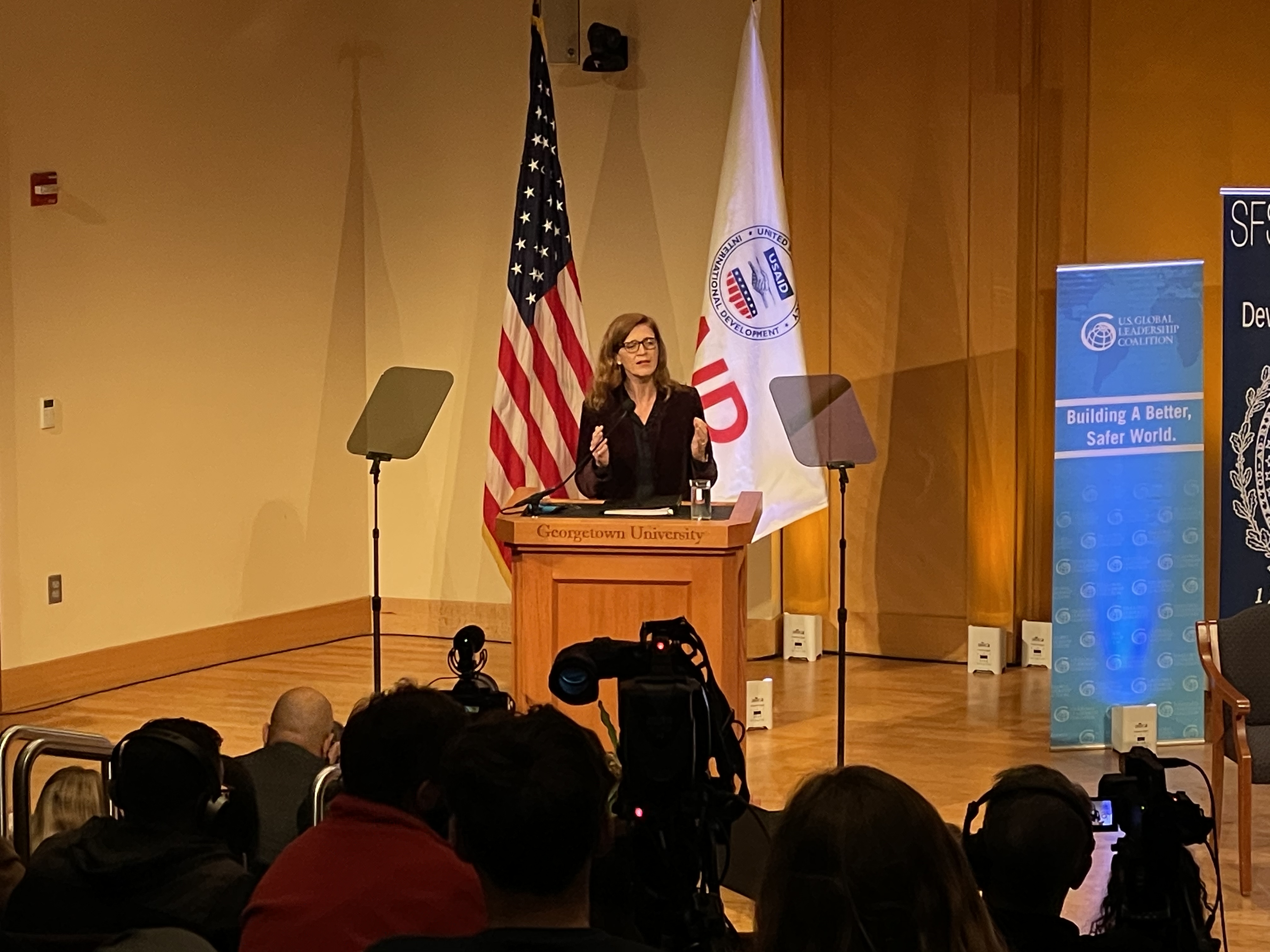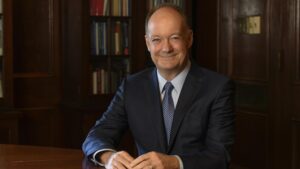Even in Washington, D.C. where everyone is someone, Samantha Power stands out: a war correspondent during the Bosnian genocide, a Pulitzer-prize winning author, a director on the National Security Council, U.S. ambassador to the U.N., and current administrator of the U.S. Agency for International Development (USAID). To a full audience drawn in by her accomplishments and the future of USAID under her leadership, Power spoke to the Georgetown community in an event on Nov. 4.
Power outlined several commitments for USAID in her remarks during the event, which was held the week of the 60th anniversary of the government agency.
“Those of you who know Samantha Power know she is an advocate, ambassador, and now administrator,” Liz Schrayer, president and CEO of U.S. Global Leadership Coalition (USGLC), said in her brief introduction for Power.
Power urged increased participation in the foreign policy process, and, drawing on President John F. Kennedy–the founder of USAID– noted the need for inclusive, equitable, and responsive development. “‘Foreign policy,’ he said, ‘is too important to all of us to leave it to the experts and the diplomats,’” Power quoted. “What happens abroad matters here at home—and though people understand that rationally—today it isn’t just an intellectual argument, it is a felt, lived experience,” she added.
As vaccine distribution in D.C. and the country continues to grow, Power reflected on the impact COVID-19 has had on the world, highlighting USAID’s efforts to distribute over 1 billion Pfizer vaccines and build the necessary horizontal infrastructure for developing countries to address future health crises.
Power commented on USAID’s recent changes to expand the diversity of the program staff to better reflect the diversity of the world in conjunction with her goal to increase the career workforce by 50 percent, noting USAID’s historical tendency to hire students from Georgetown, which is nearly 50 percent white, over students from historically Black colleges and universities (HBCUs) like Howard University. To combat these issues, Power committed to increasing the budget for paid internships by 700 percent to combat financial barriers faced by lower-income students as well as doubling the number of Donald M. Payne Fellowships.
USAID partners with over 4,000 different organizations in over 100 countries, including global, regional, and local non-governmental organizations, civil society groups, and foundations.
Several of the goals Power outlined focused on reducing bureaucratic inefficiencies within the agency. “We are often really too slow, and too bureaucratic for all but the most patient partners,” Power said. She announced the creation of a centralized, flexible fund for private engagement as well as the launch of WorkWithUSAID.org to help organizations easily learn how to partner with USAID or apply for USAID grants.
Power also committed to expanding the percentage of USAID funding that goes directly to local partners. Currently, 5.6 percent of USAID’s budget goes to such partners, but Power said the agency will increase that number to a quarter of the budget over the next four years. To kickstart the push towards expanding local capacity, Power introduced USAID’s Centroamérica Local initiative, wherein USAID will donate $300 million to local organizations on the ground in El Salvador, Guatemala, and Honduras.
In ten years, however, Power announced that half of the programming, or half of every dollar USAID receives, would go towards local communities to spearhead or design projects.
In addition to a focus on local leadership, Power spoke about the risks of governmental corruption. “Corruption is basically development in reverse,” Power said. “It is actually fully inclusive in its malignancy.”
To protect reporters, who often publish articles that combat misinformation or expose governmental corruption, Power announced the creation of a global Defamation Defense Fund to financially protect reporters from defamation lawsuits that threaten freedom of press.
Power’s decision to outline the policy commitments of the world’s premier international development agency—a speech leaders and organizations around the world will be paying close attention to—at a university dedicated to public service was not lost on audience members, many of whom were students who have admired and followed Power’s career.
Students in the audience were inspired by Power’s translation of activist work into concrete plans and interested in her application of U.S. aid and development as a tool for American foreign policy. “The work USAID does is a pretty large part of American foreign policy,” Sanjana Ranganathan (SFS ’25) said. “Given its integral role to policy work, I think it’s very fascinating to see how different people view the distribution of aid.”
Power concluded her speech with one final harken to Kennedy’s call to action, beseeching the students present to “struggle against ‘tyranny, poverty, disease, and war itself.’”





